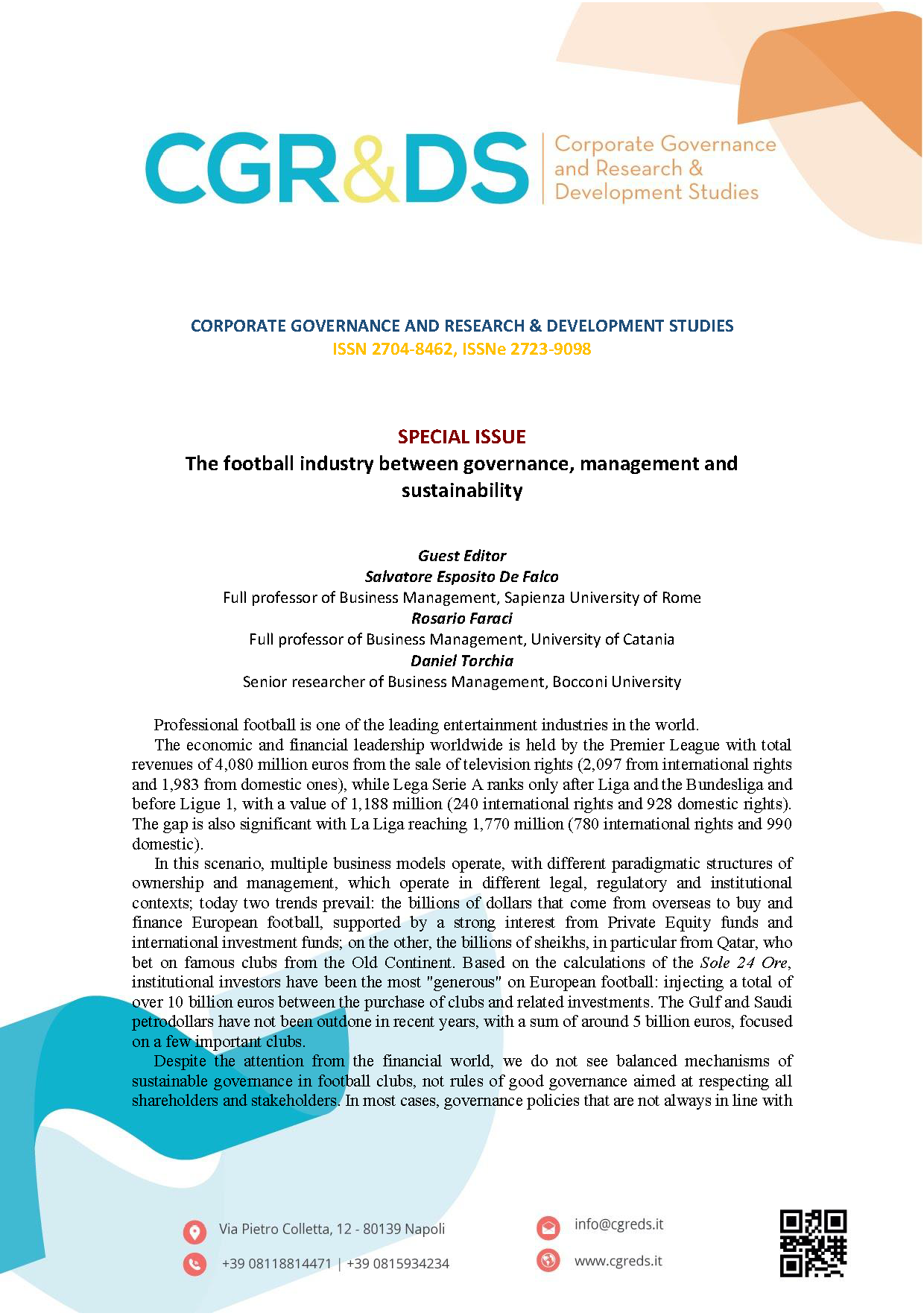
Globalization and digitization induced by recent events (Covid) have determined a path of teleological change of the firms. The relationship between profit and sustainability no longer follows dichotomous logic. The firms are moving towards a path of socialization essential for its survival.
The issue of sustainability, which previously appeared secondary in business economics studies, today is a pure necessity; the current competitive dimensions are based on intense and continuous engagement actions towards all stakeholders. This perspective is reflected in new theoretical strands such as the Social Emotional Wealth Theory, in which profit assumes secondary positions with respect to the survival not only of the company, but also of its founder, which tends to link its immortality to the name of the firms. Thus, issues related to the ESG are entering the DNA of the firms and economic policies are increasingly interested in the global aspects of sustainability (social, economic, environmental and governance).
These trends have favored the development of new firms such as B Corp and social intrapreneurships, committed to respecting certain standards (performance, transparency and social responsibility) and to optimizing their positive impact towards employees, the community in which they operate and the environment.
It could thus be said that an orientation emerges in business studies and practices that gradually moves from the old logic of profit to the logic of social responsibility. But why has this new trend appeared in recent years? (D’Orazio E., 2003). The answer is provided by Freeman (2009), for which it is necessary to replace the minimalist idea of a company solely responsible towards shareholders with that of a more responsible company towards a wider group of stakeholders, which include suppliers, customers, shareholders and local community, that is, all individuals or groups who have a "legitimate interest or a legitimate claim on the firm".
Social intrapreneurship was born and developed on these theoretical bases, as well as B Corp.
The concept of "intrapreneurship" is also not new. Already in 1978 Gifford and Elizabeth Pinchot published reflections on the intra-corporate entrepreneur. A few years later, in 1985, economist Norman Macrae credited Gifford Pinchot as the inventor of the word "intrapreneur".
From this moment on, the concept of intrapreneurship is affirmed, which, however, will gain strength and credibility especially in the present day. As has been said, recent events have accelerated the need for companies to innovate, as awareness has increased that only by opening up more towards the outside (open innovation) and towards the inside (their employees) do conditions create to free the right potential of every resource used.
An intrapreneurship company, therefore, is constantly oriented towards achieving its objectives and tends to be proactive, to generate innovative ideas and projects. It is a "learning by doing" company, capable of reacting positively to new challenges, proposing solutions and engaging in their realization, without being afraid of failure.
A further category of intrapreneur that is emerging is social intrapreneurship, which adds, to all the peculiarities identified previously (focus on objectives, proactivity, planning, etc.), that of wanting to achieve objectives that have a positive social impact. In this interpretation, the B Corp is closely linked to the Corporate Social Intrapreneurship, and both represent an evolution of the firms towards sustainable innovation.
However, to date there is no clear picture of what is meant by "sustainable innovation". In a world increasingly exposed to social, economic, ecological, technological and health risks, as dramatically evidenced by the pandemic crisis from Covid-19, innovation must promote sustainable development capable of facing the interdependence of socio-economic-environmental challenges: poverty and inequality, health and access to food, availability of water and energy sources, climate change.
This ethical conception of innovation, on the other hand, has ancient roots: starting from the second half of the twentieth century, an informal social pact was established between scientists and innovators, on the one hand, civil society, on the other (Pielke et al., 2007): freedom of research and funding in exchange for guaranteeing and generating not only knowledge, but also and above all an increase in economic value that solves the socio-economic-environmental challenges facing humanity.
In this perspective, innovation is sustainable and coherent, at a macro level, with Agenda 2030 and its 17 SDGs and, at a micro level, with a CSR (Davis, 1973; EU "Green Paper", 2000) in which the four dimensions (economic, social, environmental and governance) are fully integrated. In this way, the sustainability of the B Corp concept is combined with the innovative sustainability of social intrapreneurship.
That said, the contributions published in this Special Issue offer a broad spectrum of opinions, more or less converging, on the importance of sustainable and innovative business at the same time.
Thierry Burger-Helmchen and Erica J. Siegel, in the Invited editorial to the Special Issue, examine recent CSR trends in a broader historical evolutionary context. The authors, in particular, carry out a broad and effective historical excursus on the evolution of the CSR concept and the stakeholder approach of the firm, highlighting the affirmation of the B Corp and its potential in the field of social entrepreneurship, and wondering what whether or not it differs from CSR.
A first survey on social enterprises is carried out by Simone Poledrini and Ermanno Tortia, who describe the emergence and development of social enterprises (SE) in Italy from a theoretical perspective. The contribution highlights the historical evolution of the social enterprise in Italy, the legal forms that have emerged over time and the related changes in terms of governance, stakeholder participation, constraint on profits, tax breaks, etc. The authors also emphasize how the study of the Italian case of social enterprises has influenced the legislation of many European countries, providing them with a new business model of social enterprise.
Silvia Cosimato, Giovanni Landi and Mauro Sciarelli focus on the evolution of the B Corp, noting the particular corporate structure, alternative to the traditional one, and more attentive to social and environmental purposes, rather than profit. The paper, in particular, analyzes the Italian legislation concerning the B Corp. The study, conducted on a sample of firms, notes that the constraints do not seem to imply a better or more effective approach to issues relating to Environmental Social Governance and the related disclosure. In other words, these firms, both for their intrinsic orientation towards sustainability and for the growing social pressure towards them, naturally move towards greater corporate disclosure.
Giorgia Nigri, Mara Del Baldo and Armando Agulini investigate the case of a B Corp, the Mondora company, which produces software by translating functional requirements into operating systems. Mondora is an interesting case, since it has a leadership favorable to engagement with its stakeholders. The leadership that emerges in this firms is that of the social entrepreuner, with the characteristics of the quantum leader outlined by Tsao and Laszlo (2019), that is, of the sustainable entrepreneur (attentive to the needs of the territory and to growth in accordance with the needs of all stakeholder) which produces innovative changes.
The paper of Nicola Cucari, Eugenio D’Angelo, Eduardo Esposito e Maria Ciasullo investigates how social entrepreneurs design their business models in order to create both social and economic value. Drawing upon a single case study of Social entrepreneurship in the Italian cultural heritage sector (“La Paranza Cooperative”), the authors opened up the scope available for deeper and more detailed future research on the business model of social entrepreneurship. Main contribution lies in illustrating and formalising three generic theoretical propositions. Specifically, they suggest using an ambidexterity perspective through which social enterprises simultaneously pursue goals that are apparently contradictory, such as economic and social ones.
Finally, the article by Patrizia Gragnani, Massimo Battaglia and Nora Annesi analyzes the policies of cooperative societies on sustainability in the light of the 2030 Agenda objectives and the United Nations Sustainable Development Goals (SDGs). In particular, the research analyzes the activities dedicated to sustainability, between 2014 and 2018, by an Italian cooperative in the food sector. The choice of a cooperative society derives from the fact that its principles are more easily associated with the concept of sustainability (environmental protection, attention to the economic-social impact of its activities on the territory, expansion of governance, transparency of decisions, sharing of created value). The authors were then able to show the pertinence of SDGs as a tool to monitor and measure the contribution of firms to sustainable development.
di Salvatore Esposito De Falco and Antonio Renzi
References
Ball A.S., 2016, “Social Enterprise Governance”, U. Pa. J. Bus. L., 18: 919.
Commissione Europea, 2000, Libro Verde sugli scambi dei diritti di emissione dei gas a effetto serra nell’UE, Bruxelles.
Davis K., 1973, “The case for and against business assumption of social responsibilities”, Academy of Management journal, 16(2), 312-322.
D’Orazio E., 2003, “Responsabilità sociale ed etica d’impresa”, Notizie di Politeia, 19(72), 3-27.
Freeman R. E., 2009, “Can stakeholder theorists seize the moment?”, Journal of Corporate Citizenship, (36), 21-24.
Hiller J.S., 2013, “The benefit corporation and corporate social responsibility”, Journal of Business Ethics, 118(2), 287-301.
Kickul J., Lyons T.S., 2016, Understanding social entrepreneurship: The relentless pursuit of mission in an ever changing world, Routledge.
Loewenstein M. J., 2013, “Benefit corporations: A challenge in corporate governance”, The Business Lawyer, 1007-1038.
Pielke R., Prins G., Rayner S., Sarewitz D., 2007, “Lifting the taboo on adaptation”, Nature, 445(7128), 597-598.
Porter M.E., Kramer M. R., 2011, “The Big Idea: Creating Shared Value. How to reinvent capitalism and unleash a wave of innovation and growth”, Harvard Business Review, 89(1-2).
Quinto I., Scandurra G., Thomas A., 2019, “Internal resources and stakeholders engagement affecting environmental innovations: an exploratory research”, Corporate Governance and Research & Development Studies, n. 1/2019.
Tsao F.C., Laszlo C., 2019, Quantum leadership: new consciousness in business, Stanford University Press, California, USA.
Iscriviti alla nostra Newsletter per restare sempre aggiornato.
Articoli Recenti





